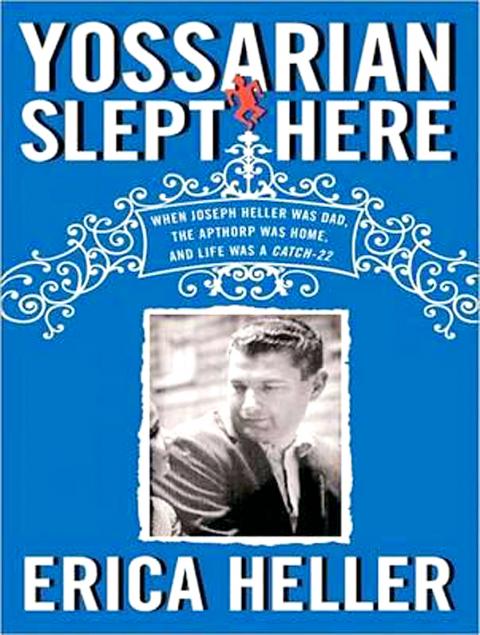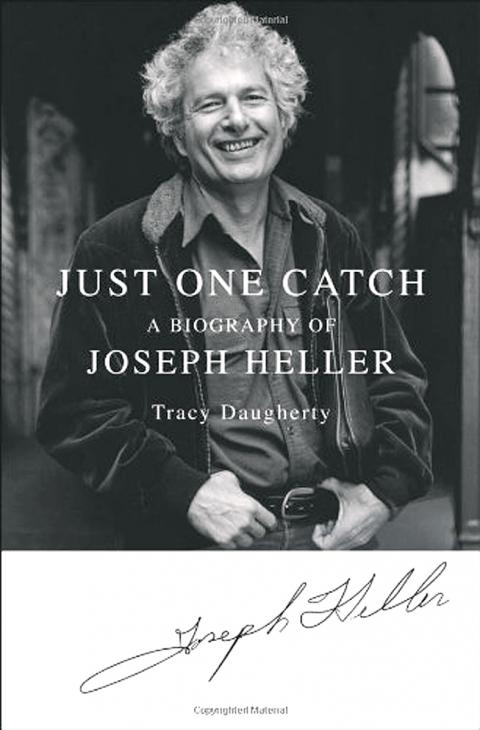At the end of his autobiography, Now and Then: A Memoir (1998), Joseph Heller sums up: “I have much to be pleased with, including myself, and I am. I have wanted to succeed, and I have ... My appetite continues hearty, and is complemented by a sterling digestive system that almost never lets me down ... I have sufficient income and money to go on living as well as I want to ... I am in love with my wife,” and “still find other women appealing.” At least he was honest. Money. Fame. Women. Good food and plenty of it. He got what he wanted. And now he gets what he deserves.
Heller owed it all to one novel, published by Simon & Schuster on Oct. 10, 1961; copies cost US$5.95, in a print run of 7,500. Erica Heller, in her memoir of her father, calls it simply “the book.” Tracy Daugherty, in his biography, traces the trajectory toward its publication: how Catch-22 became catch-22. Erica is concerned more with the consequences: how Catch-22 became a catch-22.
From Daugherty we learn the facts. Heller was born and raised in Coney Island. “The only thing about America that interests me is Coney Island,” Freud is famously reported to have remarked, and Coney Island in the 1930s was absolutely Freudtastic: gaudy, messy and magnificent; the subconscious of America. Heller left school, worked at some dead-end jobs, was drafted, and ended up flying 60 bombing missions, as bombardier, in Italy between May and October 1944. In 1945 he married Shirley Held after some sly matchmaking by Shirley’s mother. He went to the University of Southern California on the GI Bill, and then to New York University, studied writing, did an MA at Columbia, won a Fulbright, spent a year in Oxford, taught at Penn State, moved back to New York, and got into advertising, working as a copywriter. He drank a lot of martinis. Made some money. And then, in the early 1950s, he started serious work on a war story, based on his own experiences, that he called “Catch-18.”

Daugherty traces the development of Heller’s style, which was part literary, part Borscht Belt spiel, and aimed entirely at the mass market. Everything he learned from writing copy on Madison Avenue he applied to his novel: “He strove for greater precision, clarity, punch.” Heller jotted down phrases and ideas and scenes on index cards. He managed to get a few things published, got an agent, then an editor, Bob Gottlieb. With Gottlieb, he went to work on his novel as if it was an ad campaign for Remington Rand. Gottlieb compared them to surgeons: “You just cut it open, deal with the offending organs, and stitch it up again.” With the novel in good shape, Gottlieb then came up with the revised title (Leon Uris was about to publish a novel called Mila 18).
Yossarian Slept Here fills in the picture, with its portrait of Heller family life BC (Before Catch), and AC (After Catch). They lived at the Apthorp, a famous New York apartment building. “The beauty parlor was just beneath our windows ... on hotter days when windows were thrown open ... what blew in was the sulfurous smell of ammonia mixed with peroxide. No matter what my mother served us for dinner, it smelled as if it were getting a permanent.”
AC, the family moved into a larger apartment. Heller got himself a fancy dog, a Bedlington terrier that he named Sweeney. He was drowning in royalty checks.

The catch?
“Along with success,” Heller later admitted, “come drugs, divorce, fornication, bullying, travel, meditation, medication, depression, neurosis and suicide.”
And, simply, acting like an arse. Friends ceased inviting him to dinner. Asked why, one of them told him: “Joe, if I wanted to invite a ‘celebrity,’ I would have invited Frank Sinatra.”
At the height of his success Heller was capable, according to Erica, of eating two dinners and polishing it off with two pints of ice cream. On trips back to Coney Island, he’d treat himself to pea soup, a hot dog, fries, pizza, chow mein on a roll, and a hamburger with onions: He was, in several senses, a hollow man. He “took his meat, and his meals, unabashedly seriously”; everything else he treated as a joke. He had everything, but it wasn’t enough. Maybe it was his experience in the war. Maybe it was because his father had died when he was 4 years old, though neither Daugherty nor Erica make much of the fact. Erica concludes simply that Heller was “indecipherable.” Daugherty says the only thing he was missing was “his sense of himself.”
Anyway, something had to happen: Something Happened happened, Heller’s second novel, published almost 15 years after Catch-22. Erica describes it as “569 pages of hilarious but mordant, caustically wrapped, smoldering rage.”
If Catch-22 was Heller’s frustrated, wayward, unruly denunciation of war, Something Happened was his denunciation of family life. It was too much for Shirley. As their relationship broke down, Heller tried to convince Erica that her mother was crazy, that all the stuff about his affairs with other women was just in Shirley’s imagination. He insisted: “’I will never leave your mother! Never! ... Even if I can’t write or sleep or function, I still won’t leave her.’ And then about a month later he left her.”
First came the messy divorce. Then Heller fired his agent, and eventually, left his publisher and editor, in search of ever-bigger bucks. He got sick, married his nurse, wrote more novels, none of them as good as Catch-22, was estranged from his children, and Shirley was reduced to becoming a waitress for a catering company, serving at parties in the Hamptons where years earlier she would have been the guest.
Daugherty remarks that on a bombing raid, the bombardier “was always the hero or the goat.” Heller was much bigger than that. He was the hero and the goat; the Coney Island satyr.

On April 26, The Lancet published a letter from two doctors at Taichung-based China Medical University Hospital (CMUH) warning that “Taiwan’s Health Care System is on the Brink of Collapse.” The authors said that “Years of policy inaction and mismanagement of resources have led to the National Health Insurance system operating under unsustainable conditions.” The pushback was immediate. Errors in the paper were quickly identified and publicized, to discredit the authors (the hospital apologized). CNA reported that CMUH said the letter described Taiwan in 2021 as having 62 nurses per 10,000 people, when the correct number was 78 nurses per 10,000

As we live longer, our risk of cognitive impairment is increasing. How can we delay the onset of symptoms? Do we have to give up every indulgence or can small changes make a difference? We asked neurologists for tips on how to keep our brains healthy for life. TAKE CARE OF YOUR HEALTH “All of the sensible things that apply to bodily health apply to brain health,” says Suzanne O’Sullivan, a consultant in neurology at the National Hospital for Neurology and Neurosurgery in London, and the author of The Age of Diagnosis. “When you’re 20, you can get away with absolute

When the South Vietnamese capital of Saigon fell to the North Vietnamese forces 50 years ago this week, it prompted a mass exodus of some 2 million people — hundreds of thousands fleeing perilously on small boats across open water to escape the communist regime. Many ultimately settled in Southern California’s Orange County in an area now known as “Little Saigon,” not far from Marine Corps Base Camp Pendleton, where the first refugees were airlifted upon reaching the US. The diaspora now also has significant populations in Virginia, Texas and Washington state, as well as in countries including France and Australia.

May 5 to May 11 What started out as friction between Taiwanese students at Taichung First High School and a Japanese head cook escalated dramatically over the first two weeks of May 1927. It began on April 30 when the cook’s wife knew that lotus starch used in that night’s dinner had rat feces in it, but failed to inform staff until the meal was already prepared. The students believed that her silence was intentional, and filed a complaint. The school’s Japanese administrators sided with the cook’s family, dismissing the students as troublemakers and clamping down on their freedoms — with